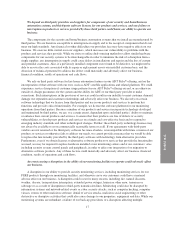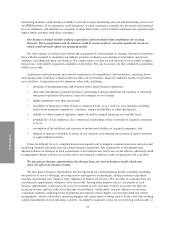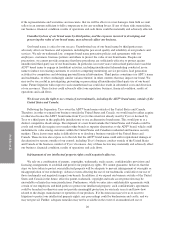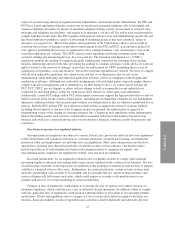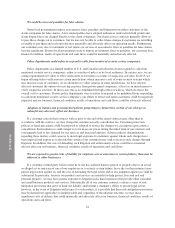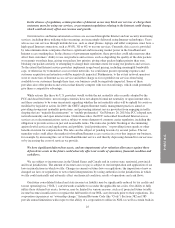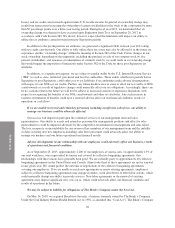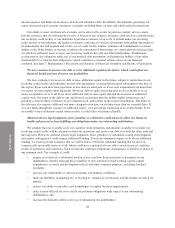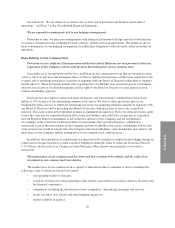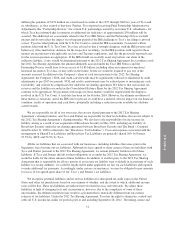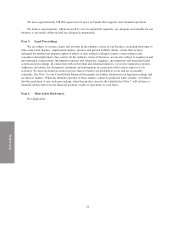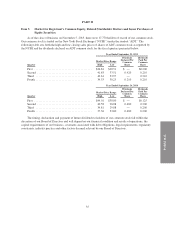ADT 2015 Annual Report Download - page 100
Download and view the complete annual report
Please find page 100 of the 2015 ADT annual report below. You can navigate through the pages in the report by either clicking on the pages listed below, or by using the keyword search tool below to find specific information within the annual report.
FORM 10-K
losses) and tax credit carryforwards against future U.S. taxable income. In general an ownership change may
result from transactions increasing the ownership of certain stockholders in the stock of the corporation by more
than 50 percentage points over a three-year testing period. During fiscal year 2013, we determined that an
ownership change was deemed to have occurred upon Separation from Tyco on September 28, 2012 in
accordance with Code Section 382. We do not, however, expect that this limitation will impact our ability to
utilize the tax attributes carried forward from pre-Separation periods.
In addition to the pre-Separation tax attributes, we generated a significant NOL in fiscal year 2013 along
with tax credit carryforwards. Our ability to fully utilize these tax assets may also be affected if in the future we
experience another “ownership change” within the meaning of Section 382 of the Code. Future changes in our
stock ownership, depending on the magnitude, including the purchase or sale of our common stock by five
percent stockholders, and issuances or redemptions of common stock by us could result in an ownership change
that would trigger the imposition of limitations under Section 382 of the Code for these post-Separation tax
attributes.
In addition, as a significant taxpayer, we are subject to regular audits by the U.S. Internal Revenue Service
(“IRS”) as well as state, territorial, provincial and local tax authorities. These audits, whether for periods before
Separation or post-Separation, could subject us to tax liabilities if tax authorities make adverse determinations
with respect to our NOLs or tax credits. Further, any future disallowance of some or all of our tax credits or NOL
carryforwards as a result of legislative change could materially affect our tax obligations. Accordingly, there can
be no assurance that in the future we will not be subject to increased taxation or experience limitations with
respect to recognizing the benefits of our NOL carryforwards and other tax attributes. Any such increase in
taxation or limitation of benefits could have a material adverse effect on our financial condition, results of
operations or cash flows.
If we are unable to recruit and retain key personnel, including an effective sales force, our ability to
manage our business could be adversely affected.
Our success will depend in part upon the continued services of our management team and sales
representatives. Our ability to recruit and retain key personnel for management positions and effective sales
representatives could be impacted adversely by the competitive environment for management and sales talent.
The loss, incapacity or unavailability for any reason of key members of our management team and the inability
or delay in hiring new key employees including sales force personnel could adversely affect our ability to
manage our business and our future operational and financial results.
Adverse developments in our relationship with our employees could adversely affect our business, results
of operations and financial condition.
As of September 25, 2015, approximately 2,200 of our employees at various sites, or approximately 13% of
our total workforce, were represented by unions and covered by collective bargaining agreements. Our
relationships with these unions have generally been good. We are currently party to approximately 40 collective
bargaining agreements in the United States and Canada. Almost one-third of these agreements are up for renewal
in any given year. We cannot predict the outcome of negotiations of the collective bargaining agreements
covering our employees. If we are unable to reach new agreements or renew existing agreements, employees
subject to collective bargaining agreements may engage in strikes, work slowdowns or other labor actions, which
could materially disrupt our ability to provide services. New labor agreements or the renewal of existing
agreements may impose significant new costs on us, which could adversely affect our financial condition and
results of operations in the future.
We may be subject to liability for obligations of The Brink’s Company under the Coal Act.
On May 14, 2010, we acquired Broadview Security, a business formerly owned by The Brink’s Company.
Under the Coal Industry Retiree Health Benefit Act of 1992, as amended (the “Coal Act”), The Brink’s Company
26



